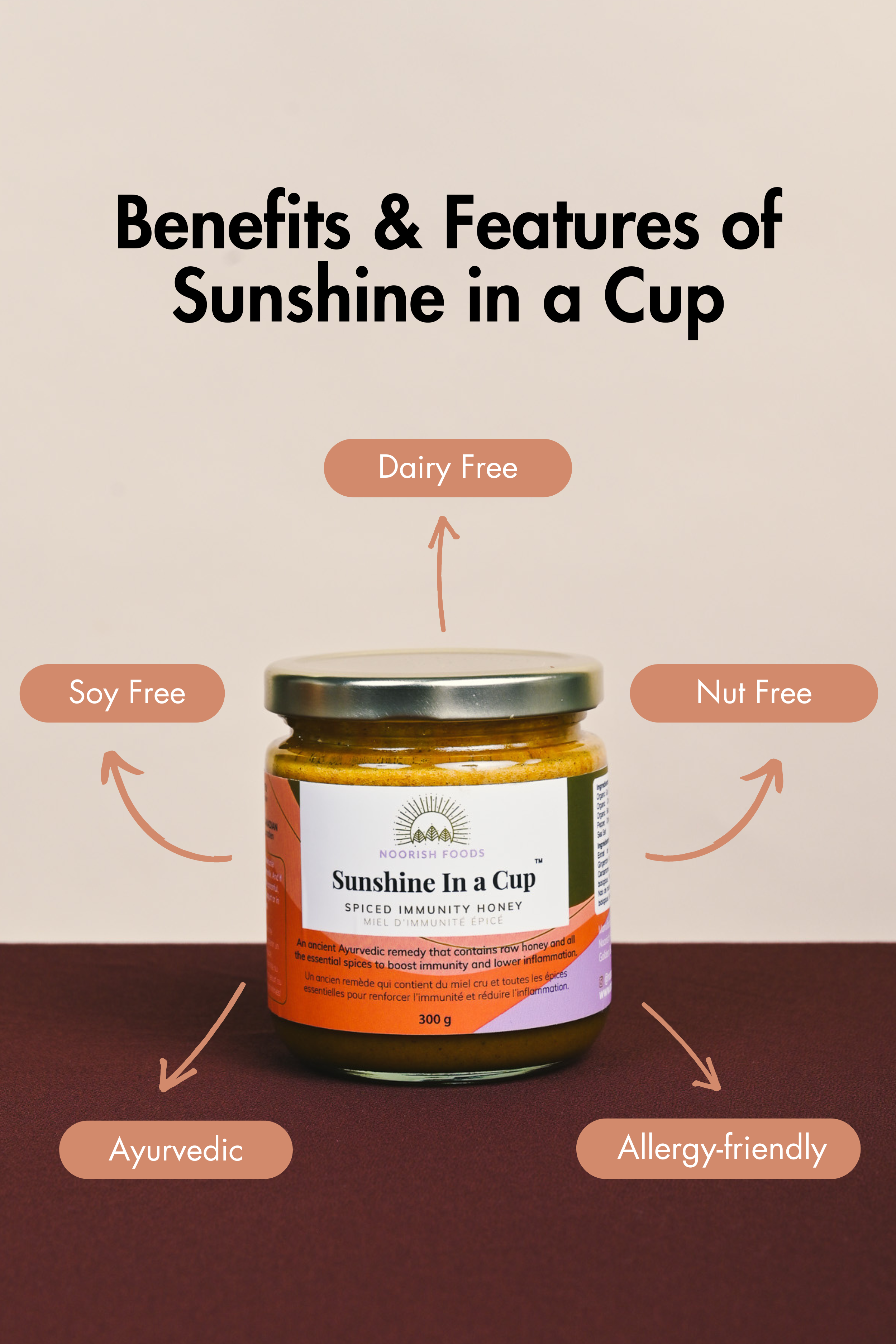The Comprehensive Handbook to Understanding spiced honey benefits
A Comprehensive Overview to the Different Kinds of Honey Available
Honey is an exceptional compound with a wide range of types, each affected by the floral resources where bees gather nectar. Comprehending these differences can boost culinary experiences and expose potential wellness benefits. From the moderate flavor of clover honey to the distinctive buildings of Manuka honey, the alternatives vary. The subtleties of each kind prompt questions regarding their one-of-a-kind qualities and usages. What might one discover regarding the world of honey?

Comprehending Honey: The Basics of Its Composition
Honey, a natural sweetener generated by bees, is mainly composed of sugars, water, and numerous natural compounds. The primary sugars discovered in honey are fructose and glucose, which contribute to its sweet taste and energy-boosting residential or commercial properties. Generally, honey includes about 17-20% water, with variants relying on the kind and handling techniques. This wetness content plays a substantial duty in honey's life span and conservation.
In enhancement to sugars and water, honey includes trace quantities of vitamins, minerals, and antioxidants, which can vary widely based upon the floral sources that the go to. These natural compounds add to honey's potential wellness benefits, consisting of antimicrobial buildings. The special structure of honey is influenced by variables such as the region, environment, and the particular plants readily available to the bees, making it a facility and interesting substance that extends beyond mere sweet taste.
Popular Types of Honey and Their One-of-a-kind Tastes
A rich variety of honey types exists, each offering distinctive flavors and qualities influenced by the nectar sources seen by bees. Clover honey, understood for its light color and light, sweet preference, is among one of the most popular ranges. Wildflower honey, on the various other hand, boasts a complex flavor profile, differing substantially depending on the seasonal blooms in the region.
For those looking for a bolder taste, buckwheat honey attracts attention with its dark color and robust, malty flavor. Orange bloom honey, acquired from citrus trees, gives a fragile and fruity sweetness, making it a favored in teas and desserts.
Additionally, lavender honey provides a distinct flower aroma, perfect for gourmet applications. Each kind of honey not only improves cooking productions yet additionally showcases the varied communities that sustain populaces, showing the intricate connection between flora and animals.
Regional Varieties: Honey From Around The Globe
Regional honey ranges mirror the varied landscapes and floral resources throughout the world, each adding distinct tastes and attributes. canadian honey brands. Manuka honey from New Zealand is renowned for its robust preference and anti-bacterial homes, derived from the nectar of the Manuka tree. In comparison, Mediterranean thyme honey provides a great smelling, herbal profile, recording the essence of the sun-drenched areas where thyme embellishments
Relocating To The United States and Canada, clover honey is widely favored for its moderate sweet taste and flexibility, commonly made use of in day-to-day food preparation. On the other hand, the rich, dark buckwheat honey from the United States is celebrated for its strong flavor and high antioxidant material.
In Asia, jasmine honey from Thailand provides a fragile floral aroma, reflecting the neighborhood flora. Each regional range not just showcases the richness of its setting yet also connects societies with their distinct cooking uses and traditions.
The Wellness Conveniences of Various Honey Kinds

Culinary Uses: Incorporating Honey Into Your Recipes
Integrating honey right into cooking productions provides a natural means to enhance flavors and sweet taste. From sweetening drinks to including deepness in baking and polishing meats and vegetables, honey serves versatile functions in the kitchen. Exploring these usages can raise both easy and complicated recipes alike.
Sweetening Beverages Normally
How can honey boost the flavor of beverages while giving an all-natural sweet taste? Honey offers as a versatile sweetener, boosting numerous drinks with its special taste profiles. From herbal teas to shakes, honey can enhance and enhance the all-natural active ingredients, offering a depth that granulated sugars often do not have. Different kinds of honey, such as clover or wildflower, can present distinct taste notes, permitting innovative personalization in drinks. Additionally, honey liquifies easily, making it a suitable option for cold beverages where standard sweeteners may glob. Utilizing honey not only sweetens however likewise includes potential health and wellness advantages, such as antioxidants and relaxing properties. As a natural choice, honey enriches beverages while advertising a wholesome method to taste enhancement.
Honey in Cooking

Baking with honey introduces a rich complexity to a variety of recipes, enhancing both taste and appearance. As an all-natural sugar, honey not just provides sweetness yet additionally adds dampness, leading to tender baked products. Its varied flavor profiles, relying on the type used, can raise breads, cakes, and cookies. When substituting honey for sugar, bakers ought to minimize the liquid in the recipe slightly, as honey adds additional moisture. In addition, honey's acidity can improve the effectiveness of baking soft drink, promoting a desirable increase. This versatility enables imaginative experimentation, enabling bakers to infuse one-of-a-kind tastes into standard recipes. In general, incorporating honey into cooking deals a chance to discover brand-new dimensions in culinary productions.
Glazing Meats and Vegetables
Honey works as an excellent polish for meats and vegetables, adding a distinct sweetness that enhances the overall taste profile of dishes. When utilized as a glaze, honey caramelizes magnificently, creating a glossy surface that not only looks appealing but also intensifies the preference. Popular options include honey mustard polish for poultry, which incorporates the sweetness of honey with the tang of mustard, or a honey-soy blend for glazing roasted veggies. Additionally, honey can be infused with natural herbs or spices, such as rosemary or chili flakes, to produce distinct taste mixes. This flexibility makes honey a vital component in cooking applications, allowing home chefs and cooks alike to raise their dishes with marginal effort.

Tips for Choosing and Keeping Honey Appropriately
When selecting and storing honey, it is necessary to take into consideration both quality and preservation to ensure the very best flavor and wellness advantages. Go with raw, unfiltered honey, as it keeps much more nutrients and enzymes compared to processed varieties. Search for honey that is labeled with its floral resource, which can suggest its distinct taste account and prospective health buildings.
For storage space, pick an awesome, dark place, far from direct sunshine and heat resources, to avoid deterioration. Glass containers are better, as they do not interact with honey, unlike some plastic options. Ensure the lid is tightly sealed to maintain moisture out, as honey is hygroscopic and can absorb water, leading to fermentation. Ultimately, prevent refrigerating honey, as it can crystallize. By following these guidelines, the quality and long life of honey can be successfully maintained, assuring a wonderful experience with every use.
Regularly Asked Questions
Can Honey Expire or Go Negative Gradually?
Honey does not expire in the typical sense. Its low dampness web content and all-natural preservatives add to its long life, allowing it to remain safe to eat for many years, though crystallization might happen over time.
What Should I Look for in Organic Honey?
When choosing natural honey, one must analyze the product packaging for accreditation labels, check for purity without ingredients, and take into consideration the floral source. In addition, examining the color and uniformity can show high quality and freshness.
Exactly How Can I Inform if Honey Is Pure?
Establishing honey's purity involves observing its quality, consistency, and taste (wildflower honey). In addition, performing a water examination or looking for labeling qualifications can further confirm credibility, guaranteeing that the honey remains devoid of additives or fabricated ingredients
Is Honey Suitable for Vegan Diets?
The inquiry of honey's suitability for vegan diet plans often develops. Several vegans avoid honey because click here of its pet origin, preferring plant-based options. Others might choose honey, seeing it as a lasting item when fairly sourced.
What Are the Environmental Influences of Honey Production?
The ecological effects of honey production include environment loss, pesticide direct exposure to bees, and potential decreases in bee populations. Sustainable methods are essential to minimize these effects and promote environmental balance while preserving honey production.